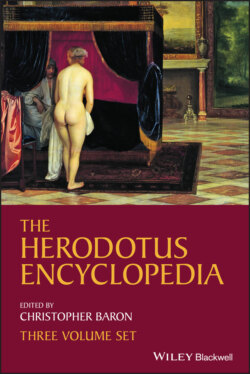Читать книгу The Herodotus Encyclopedia - Группа авторов - Страница 676
ARISTOTLE
ОглавлениеSUSAN D. COLLINS
University of Notre Dame
Writing in the century after Herodotus, Aristotle refers to him directly only a few times in his works. Although these references show that Aristotle had read and was willing to make use of the Histories, they do not definitively establish his view of the work. His most definitive statement occurs in the Poetics. There he identifies Herodotus as an “historian” just prior to introducing his well‐known distinction between history (historia) and poetry (poiēsis): history speaks of what has come to be, whereas POETRY speaks of the sort of things that could come to be (what is likely or necessarily to happen). On this account, poetry is both more philosophic and more serious than history, since poetry speaks more of general things and history of particular things (Pol. 1451a36–51b7). The immediate difficulty is that Aristotle’s statement assumes the disciplinary divisions of the fourth century BCE, a development for which Aristotle himself deserves much credit. Hence, it would seem that the classification of Herodotus as an historian is anachronistic, since, in writing in the fifth century, he is not confined by later disciplinary lines.
However few, Aristotle’s references to the Histories themselves illustrate the range of Herodotus’ inquiries and the ways in which they defy easy classification. For example, he not only makes use of Herodotus’ observations of natural phenomena (Eth. Eud. 1236b9; Gen. an. 736a10–13; Hist. an. 523a17), but his own descriptive approach to these phenomena reflects that of Herodotus; some scholars argue that he occasionally even borrows from Herodotus without attribution. Yet Aristotle is also sometimes critical of Herodotus’ descriptions and in one instance calls him a “mythologist,” holding him responsible for promoting an error, based on poor observation, about how FISH copulate (Gen. an. 756b3–8). These kinds of statements make Aristotle at least partly responsible for the view that Herodotus is a “liar,” a criticism that extends to Herodotus’ inquiries into moral and political matters in which his naturalist studies are embedded. As is clear from the centuries‐long dispute, it is difficult to adjudicate this criticism not least because Herodotus’ inquiries reflect the variability, particularity, and ambiguity of human affairs. Hence, for example, he frequently reports without comment various stories or interpretations of the same event, and the significance of these stories to his inquiry is not always clear. In his Rhetoric, Aristotle identifies Herodotus’ writing with the “ancient way”: as “continuous” or “running together” in the sense that it has no end in itself but is completed only when the matter spoken of comes to its end. Observing that this way of writing is unpleasant since it seems to be limitless, Aristotle notes that readers find it tiring, just as runners become fatigued in a long race when they cannot see the finish line (Rh. 1409a27–35).
Some scholars argue that Aristotle is not just critical of Herodotus, but actively hostile to his approach. Others not only dispute this view but suggest that Aristotle may not necessarily be denying philosophic seriousness to the Histories, a work which, after all, investigates “causes” (aitiai) and provides a “reasoning” (LOGOS). Indeed, we see that in another direct reference to the Histories, in his Constitution of Athens, Aristotle virtually imitates Herodotus’ way of writing in offering without comment two stories, including one from Herodotus, regarding a particular event: the tyrant PEISISTRATUS’ return to ATHENS and the trick MEGACLES (II) used to persuade the people of Athens that this return had divine sanction (Ath. pol. 14.4). There is no doubt that Aristotle diverges from Herodotus on the relation of history to PHILOSOPHY and the quest for wisdom, but perhaps in this way, he nods in the direction of the “historian” and the “ancient way” of treating human affairs by acknowledging the difficulty of inquiring into these affairs, which are by their very nature particular, disputable, and subject to CHANGE and fortune (see also Eth. Nic. 1094b11–18, 1100a5–11).
SEE ALSO: Hellenistic Historians; Historical Method; historiē; Knowledge; Reception of Herodotus, Ancient Greece and Rome; Rhetoric; Scholarship on Herodotus, Ancient Greece and Rome; Thurii
